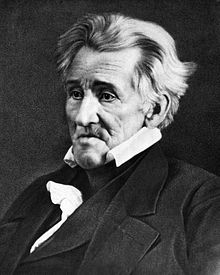Jacksonian democracy
Jacksonian Democracy is a series of suffrage and economic reforms that began with the inauguration of Andrew Jackson in 1829 and are of great significance to the political history of the United States.
Jacksonian Democracy extended the right to vote - from exclusively land-owning males - to all white males over 21 and limited the federal government's influence over the economy, while federal agencies were restructured. Another goal was to strengthen states' rights relative to Washington, D.C., and the territorial expansion of the United States. One motive for the reforms was the prevailing egalitarian sentiment in the United States during the increasing social stratification of the 1820s and 1830s, which aimed to eliminate privileges for members of the federal government. Initial efforts in this direction had already occurred during the presidency of Thomas Jefferson. The economic policy content of Jacksonian Democracy served its supporters to reject rapid economic change, which they believed negatively affected their daily lives. With this in mind, they distrusted the power of banks and increasing entanglement in a market economy, as well as a federal government that favored both of the aforementioned developments. This corresponds with the hostility Jackson harbored toward the Second Bank of the United States. Historian Sean Wilentz identifies three interwoven guiding principles as hallmarks of Jacksonian democracy: a robust nationalism aligned with the U.S. Constitution, tempered by restraint in federal spending policies; a deep-seated distrust of the power of concentrated capital; and an absolute prioritization of the democratic will of the people.
The Indian policy of Jacksonian Democracy was based in its prioritization of states' rights and stands as an example of the harmful effects of this political program. By this time, the public's image of the Indians had changed from that of Thomas Jefferson's tenure; they were no longer seen as "noble savages" but as barbarians who stood in the way of land reclamation. The Southern states therefore pushed for the removal of these peoples to areas west of the Mississippi River. When federal treaty efforts with the Indians and the Indian Removal Act of 1830 did not go far enough for them, they took matters into their own hands. With pressure and cunning, they deprived the peoples of their lands. When in 1832 the United States Supreme Court under John Marshall signaled that Georgia had unlawfully appropriated Cherokee land, Jackson did nothing to stop that state. On the other hand, as president, he gave the highest priority to the Union, as was evident in the nullification crisis of 1832/1833, when he made clear in a statement that he was prepared to use force, if necessary, to enforce federal law in South Carolina against the nullification doctrine.

Andrew Jackson
Search within the encyclopedia